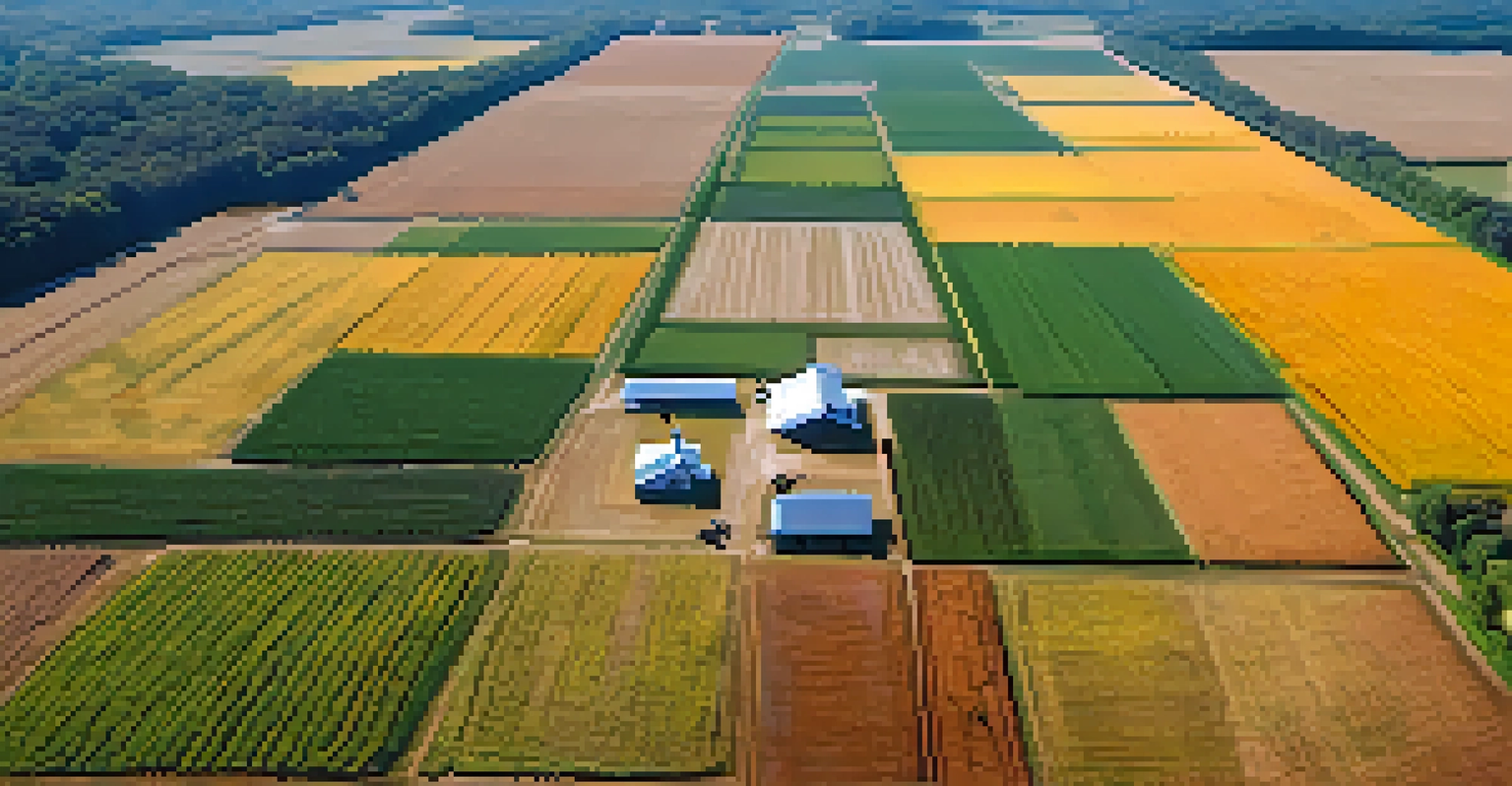Farming Practices in North Carolina: Tradition Meets Innovation

The Rich Heritage of North Carolina Farming
North Carolina boasts a rich agricultural heritage that dates back centuries. Many families have farmed the same lands for generations, passing down knowledge and practices. This deep-rooted connection to the land fosters a sense of community among farmers, creating a culture that values tradition and sustainability.
Agriculture is our wisest pursuit, because it will in the end contribute most to real wealth, good morals, and happiness.
The state's diverse climate and geography allow for a wide variety of crops, from tobacco to sweet potatoes. These traditional crops have shaped not only the economy but also the culinary landscape of the region. Festivals celebrating these crops often bring together communities, reinforcing the importance of agriculture in everyday life.
However, as the world changes, so too does the approach to farming in North Carolina. Farmers are now integrating innovative practices to enhance productivity while respecting the environment. This blend of old and new illustrates the adaptability of North Carolina’s agricultural sector.
Embracing Technology in Agriculture
In recent years, North Carolina farmers have increasingly turned to technology to improve their yields. Precision agriculture, which utilizes data and analytics, allows farmers to make informed decisions about planting, watering, and harvesting. This approach minimizes waste and maximizes efficiency, ensuring that resources are used wisely.

Drones, for example, are becoming a common sight over North Carolina fields. They provide aerial imagery that helps farmers monitor crop health and identify issues before they escalate. This technology not only saves time but also enhances the overall quality of the crops produced.
Rich Agricultural Heritage
North Carolina has a deep-rooted agricultural tradition that emphasizes community, sustainability, and the passing down of farming knowledge through generations.
Moreover, the rise of agritech startups in the state signifies a shift towards a more tech-savvy agricultural landscape. By fostering innovation, North Carolina is positioning its farmers to meet the challenges of the future while staying true to their roots.
Sustainable Practices Taking Root
Sustainability is more than a buzzword in North Carolina; it's a vital practice for many farmers. With increasing awareness about environmental issues, farmers are adopting eco-friendly methods that preserve soil health and promote biodiversity. Crop rotation and cover cropping are just two practices that help maintain the land's integrity.
Sustainability is no longer about doing less harm. It’s about doing more good.
Additionally, many farmers are exploring organic farming, which not only caters to a growing market but also enhances soil quality over time. By avoiding synthetic fertilizers and pesticides, these farmers are contributing to a healthier ecosystem while producing high-quality food.
The commitment to sustainability is a testament to the farmers’ respect for the land and their desire to leave a thriving environment for future generations. This blend of tradition and innovation is ensuring that farming in North Carolina remains viable and vibrant.
The Role of Local Markets
Local markets play a crucial role in supporting North Carolina's agricultural community. Farmers' markets provide a direct channel for producers to sell their goods, fostering relationships between consumers and farmers. This direct connection not only benefits the local economy but also encourages the consumption of fresh, seasonal produce.
Beyond just selling produce, these markets often serve as community hubs where people gather to celebrate local culture and agriculture. Events featuring live music, cooking demonstrations, and educational workshops help raise awareness about the importance of local farming.
Technology Enhances Farming
Farmers in North Carolina are increasingly embracing technology, such as precision agriculture and drones, to improve efficiency and crop quality.
Moreover, the rise of Community Supported Agriculture (CSA) programs has further strengthened this connection. By purchasing a share of a farm's harvest, consumers directly support farmers while enjoying fresh, organic produce throughout the season.
Education and Research: The Backbone of Innovation
Education and research are vital components in the evolution of farming practices in North Carolina. Collaborations between universities and agricultural organizations drive innovation by providing farmers with the latest research findings. This partnership ensures that farmers are equipped with knowledge and tools to implement new techniques effectively.
Extension programs offered by institutions like North Carolina State University provide invaluable resources to farmers. These programs offer workshops, field days, and individualized consultations, helping farmers navigate challenges and adopt best practices.
Moreover, as students enter the agricultural field with fresh perspectives, they bring new ideas that can lead to innovative solutions. This continuous cycle of learning and adaptation is essential for the growth and sustainability of North Carolina's farming industry.
Challenges Facing North Carolina Farmers
Despite the many advances, North Carolina farmers face several challenges that threaten their livelihoods. Climate change, for instance, poses risks such as unpredictable weather patterns and extreme conditions. These factors can affect crop yields and the overall health of the farming ecosystem.
Additionally, market fluctuations and competition from imported goods can create financial strains. Farmers must navigate these economic challenges while striving to maintain quality and sustainability in their practices.
Commitment to Sustainability
Many farmers are adopting sustainable practices, including organic farming and crop rotation, to preserve the environment and ensure the longevity of their land.
However, resilience is a hallmark of North Carolina farmers. Through community support, innovative practices, and a commitment to tradition, they are finding ways to overcome these hurdles and continue contributing to the state's rich agricultural tapestry.
The Future of Farming: A Blend of Old and New
Looking ahead, the future of farming in North Carolina appears promising, as a blend of tradition and innovation takes center stage. Farmers are increasingly open to adopting new technologies while still honoring the age-old practices that have served them well. This dynamic approach allows for a more resilient agricultural sector capable of adapting to changing conditions.
As consumers become more conscious of where their food comes from, the demand for locally sourced products continues to rise. This trend encourages farmers to embrace sustainable practices and innovation, creating a win-win situation for both producers and consumers.

In conclusion, North Carolina’s farming practices exemplify a harmonious relationship between tradition and innovation. By respecting their heritage while adapting to modern challenges, farmers in the state are not just cultivating crops; they are nurturing a sustainable future.